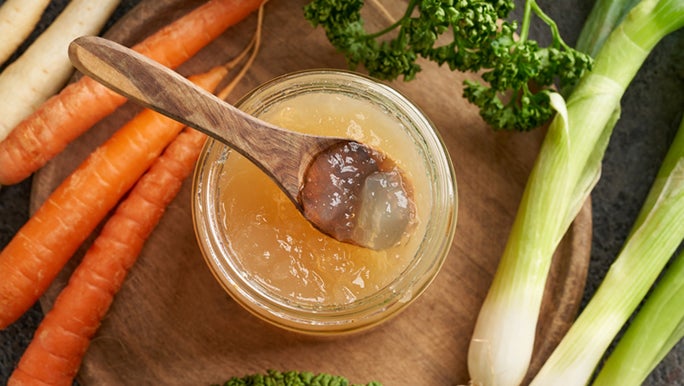Key Points
- Bone broth may support gut health by providing our bodies with various nutrients.
- How the bone broth is prepared may change its nutrient profile.
- Bone broth is easily digested as it’s a liquid, which means the body doesn’t need to break it down
Trust your gut – bone broth is gold
Bone broth is jam-packed with nutrients. It’s filled with minerals and amino acids that help our bodies function well – and that includes supporting gut health.
It may seem like there’s been a lot of hype around bone broth in recent years, but it’s one of the foods that lives up to the hype.
Let’s jump into some of the nutrients that bone broth contains and how bone broth may benefit gut health:
- Amino acids are the main fuel source for the small intestinal mucosa (a mucous layer in the small intestine where much of the nutrient uptake of our food occurs). There are promising studies on amino acids like L-glutamine for gut health, showing how they can support growth and health in humans.
- Proteins assist with cell growth and repair throughout our entire bodies, including our guts.
- Collagen helps build cells throughout our entire bodies. Studies have shown that it may improve mild digestive symptoms and relieve bloating in otherwise healthy adult females.
- Gelatin contained in the bones to make bone broth may help reduce inflammation in the gut
- Minerals including calcium, magnesium, zinc and iron can be found in bone broth, depending on how it’s prepared. Minerals are important for our overall health, as they can help fight infection, improve bone strength and regulate hormones.
This abundance of nutrients is one of the reasons bone broth may benefit gut health and, as a result, our overall health.
Many foods contain these nutrients – so why the hype around bone broth??
We can find nutrients in a wide variety of foods, including fruit, vegetables, grains and animal products. But the unique benefit of bone broth comes down to its easily digested form.
“Any good protein source, like lean meat, chicken, beef, eggs or tofu, contains proteins that break down into amino acids,” Gabbie explains. “These then help to keep the gut lining healthy and aid in restoring it when it is under stress. But the reason broth can be easily digested is because it’s a liquid. The body doesn’t have to break it down like a meat source.”

When making bone broth for gut health, it’s preferable to source bones from a farm that has fed the animals a nutritious diet
What impacts the nutritional value of bone broth?
The quantity and quality of nutrients and minerals in bone broth depends on a few factors.
How the animal was raised
An animal’s bones may have a different nutrient profile depending on how it was raised, says Gabbie.
“It’s important to source bones from a farm that’s fed the animals a nutritious diet, as this will ultimately determine what vitamins and minerals are found in the end product” she notes.
Which bones are used
People traditionally use a range of bones to make broth – look out for those that contain connective tissue, for example knuckles, necks, ribs or bones with marrow.
How the broth is prepared
“Cooking the bones at a slower rate draws out nutrients and minerals into the broth,” says Gabbie.
Additionally, adding something acidic, like apple cider vinegar or lemon, has been shown to extract more of certain minerals like magnesium and calcium.
Homemade vs. store-bought: what’s the best bone broth for gut health?
Don’t have the time to make your own bone broth? No problem! Both homemade and store-bought bone broths may benefit gut health, according to Gabbie. So whether you want to make or buy yours depends on your lifestyle.
In either case, you may want to consider if the bones used are good quality and sourced from farms that have provided their animals with nutritious food.
If you’re buying bone broth for gut health, you may also want to look at what’s been added to the broth. They sometimes contain sodium, salt and preservatives, which some people may want to avoid.

Chicken broth and broth made from beef bones are both good for gut health
How to drink bone broth
How often do you need to be drinking bone broth? There’s no clear answer. Gabbie notes that whether you drink it daily, weekly or infrequently, each cup will provide a good amount of amino acids and help deliver nutrients to the gut.
It’s important to note that while bone broth benefits gut health, it’s not intended to heal specific conditions. Your gut is complex and needs many vitamins, minerals and polyphenols to help it function optimally.
However, the research behind bone broth for gut health is promising. Animal studies show it can reduce inflammation in ulcerative colitis. There needs to be more studies completed on humans before we can know whether this applies to us too.
Which is better for your gut? Chicken or beef bone broth?
“One isn’t necessarily better than the other,” says Gabbie. “They're just a bit different. They might have a different nutrient profile mix because it also depends on how the animal was raised.”

Gelatin is one of the nutrients found in bone broth that may help support gut health
Concerned about your gut health?
Gut health is a hot topic, and there’s a lot of advice out there. It’s important to know that not everything you read is backed by evidence, and there’s no one-size-fits-all solution.
If you’re experiencing symptoms that you think could be related to your gut, talk to your healthcare professional. They’ll be best equipped to give the advice you need.
Related:
Gabbie Watt is a Naturopath and is passionate about blending evidence-based practice and traditional natural medicine into her approach. With experience previously working as a Radiation Therapist, Gabbie’s professional background in conventional medicine has been instrumental in shaping her holistic approach to health.
Reviewed by healthylife health experts February 2023.


